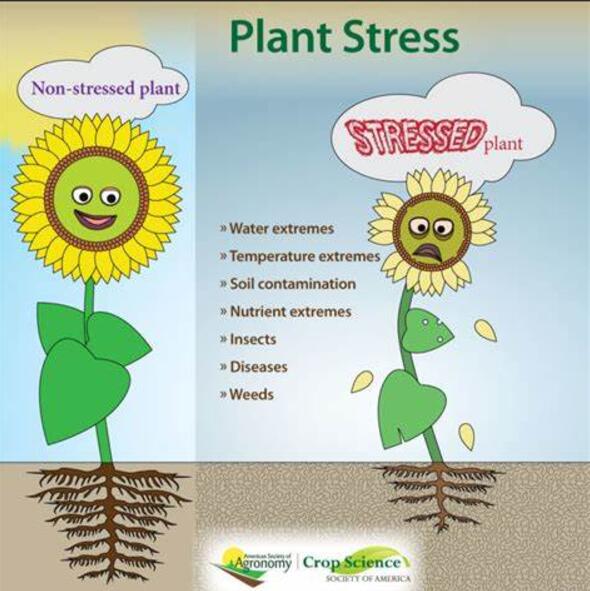地区性蜂胶提取物可抑制镰刀菌,促进水稻秧苗生长和对巴卡奈病的反应
IF 6.8
Q1 PLANT SCIENCES
引用次数: 0
摘要
由 Fusarium fujikuroi 引起的 Bakanae 是一种严重的种子传播疾病,影响着全世界的水稻生产。在此,我们研究了蜂胶的潜力,蜂胶是一种天然蜜蜂产品,采集自埃及的三个地理位置:北部(梅诺菲亚)、中部(开罗)和南部(索哈格):用四种不同的溶剂(乙醇、橄榄油、正己烷和水)提取蜂胶,作为一种可持续的生态友好型替代品来控制水稻的巴卡奈病害。体外实验表明,蜂胶提取物对 F. fujikuroi 具有抗真菌活性,能显著抑制其菌丝生长和孢子繁殖。蜂胶提取物的抗真菌活性与其化学成分有关,而化学成分因产地和提取溶剂而异。此外,基于扫描电子显微镜的分析表明,北方蜂胶乙醇提取物显著改变了藤黄菌的微孢子形态,使其萎缩并似乎失去了活力。这些发现在温室条件下得到了进一步证实。与模拟处理的对照组相比,用1000 ppm蜂胶提取物浸泡Fujikuroi接种的水稻种子可显著降低白粉病发病率和病害严重程度指数。虽然褐飞虱会诱导 H2O2 的积累,但使用蜂胶提取物可缓解氧化应激,并显著降低受感染秧苗体内的 H2O2 水平。此外,蜂胶提取物还能提高受 Fujikuroi 感染的水稻秧苗中酶抗氧化剂(愈创木酚依赖性过氧化物酶 [POX] 和多酚氧化酶 [PPO])的含量。最后,蜂胶提取物处理的水稻秧苗表现出更高的三个 PTI 标志基因转录水平,包括病原相关基因非表达因子 1(OsNPR1)、WRKY 转录因子 21(OsWRKY21)和苯丙氨酸氨化酶(OsPAL1),这些基因与系统获得性抗性(SAR)有关,对植物对病原体的防御反应至关重要。总之,这些研究结果表明,蜂胶具有抗真菌特性,能够在受感染植物体内诱导复杂的多层防御系统,因此可能是一种很有前景的可持续、生态友好型替代品,可用于控制巴卡奈病和其他真菌种子传播的植物病原体。本文章由计算机程序翻译,如有差异,请以英文原文为准。
Regional propolis extracts suppress Fusarium fujikuroi and boost rice seedling growth and response against Bakanae disease
Bakanae, caused by Fusarium fujikuroi, is a serious seed-borne disease affecting rice production worldwide. Herein, we investigated the potential of propolis, a natural honeybee product, collected from three geographic locations in Egypt: North (Menofia), Middle (Cairo), and South (Sohag), and extracted with four different solvents (ethanol, olive oil, hexane, and water) as a sustainable eco-friendly alternative to control the Bakanae disease in rice. In vitro experiments showed that propolis extracts exhibited antifungal activity against F. fujikuroi and significantly suppressed its mycelial growth and sporulation. The antifungal activity of propolis extracts was associated with its chemical composition which varied depending on geographical origin, and the extraction solvents. Moreover, SEM-based analysis revealed that ethanolic extract of northern propolis prominently altered the microconidia morphology of F fujikuroi, which shrunken and seemed to lose their viability. These findings were further confirmed in vivo under greenhouse conditions. Soaking F fujikuroi-inoculated rice seeds in 1000 ppm of propolis extract significantly reduced the bakanae disease incidence, and disease severity index compared to mock-treated controls. Although infection with F fujikuroi induced the accumulation of H2O2, the application of propolis extracts alleviated oxidative stress and significantly reduced the H2O2 levels within infected rice seedlings. Moreover, propolis extracts enhanced the profile of enzymatic antioxidants (guaiacol-dependent peroxidase [POX] and polyphenol oxidase [PPO]) in F. fujikuroi-infected rice seedlings. Finally, Propolis extracts-treated rice seedlings exhibited higher transcript levels of three PTI-marker genes including nonexpressor of pathogenesis-related genes 1 (OsNPR1), WRKY transcription factor 21(OsWRKY21), and phenylalanine ammonia-lyase (OsPAL1), which are associated with systemic acquired resistance (SAR) and crucial for the plant's defense response against pathogens. Collectively, these findings suggest that propolis might be a promising sustainable, eco-friendly alternative to control bakanae disease and other fungal seed-borne phytopathogens due to its antifungal properties and ability to induce a complex multilayered defense system within infected plants.
求助全文
通过发布文献求助,成功后即可免费获取论文全文。
去求助
来源期刊

Plant Stress
PLANT SCIENCES-
CiteScore
5.20
自引率
8.00%
发文量
76
审稿时长
63 days
期刊介绍:
The journal Plant Stress deals with plant (or other photoautotrophs, such as algae, cyanobacteria and lichens) responses to abiotic and biotic stress factors that can result in limited growth and productivity. Such responses can be analyzed and described at a physiological, biochemical and molecular level. Experimental approaches/technologies aiming to improve growth and productivity with a potential for downstream validation under stress conditions will also be considered. Both fundamental and applied research manuscripts are welcome, provided that clear mechanistic hypotheses are made and descriptive approaches are avoided. In addition, high-quality review articles will also be considered, provided they follow a critical approach and stimulate thought for future research avenues.
Plant Stress welcomes high-quality manuscripts related (but not limited) to interactions between plants and:
Lack of water (drought) and excess (flooding),
Salinity stress,
Elevated temperature and/or low temperature (chilling and freezing),
Hypoxia and/or anoxia,
Mineral nutrient excess and/or deficiency,
Heavy metals and/or metalloids,
Plant priming (chemical, biological, physiological, nanomaterial, biostimulant) approaches for improved stress protection,
Viral, phytoplasma, bacterial and fungal plant-pathogen interactions.
The journal welcomes basic and applied research articles, as well as review articles and short communications. All submitted manuscripts will be subject to a thorough peer-reviewing process.
 求助内容:
求助内容: 应助结果提醒方式:
应助结果提醒方式:


